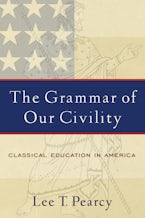
The Grammar of Our Civility
Classical Education in America
Imprint: Baylor University Press
Sales Date: 2005-08-17
200 Pages, 6.00 x 9.00 x 0.59 in

Imprint: Baylor University Press
Sales Date: 2005-08-17
200 Pages, 6.00 x 9.00 x 0.59 in